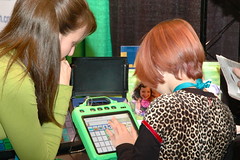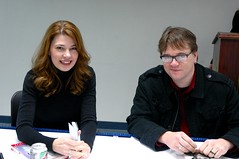The box will contain Schuyler's new Big Box of Words.
When I mentioned the fact that Schuyler had been approved for funding for the device, I got a lot of questions about it. I thought it would be helpful for some of you if I devoted an entire post to this.
First of all, the device itself. It is the Vantage Lite, built by the Prentke Romich Company, and it is basically the next generation of what Schuyler has now. It will communicate the same way, using PRC's Unity® language system, but with a lot of new features and capabilities. This is what I'm reading (and possibly getting some of this wrong, sorry if my information turns out to be less than accurate):
- The Vantage Lite adds a vocabulary setting -- a 60-key sequence -- to bridge the gap between the simple 45-key setting that Schuyler started on and the 84-key she uses now. Not a benefit for Schuyler, who has been using the 84-key setting for most of her time with the BBoW, but I think it's a good transitional step. That change was a big one and took a while for Schuyler to become comfortable with.
- It has 64k graphic capability, up from 256 colors on Schuyler's device.
- It has something new called Visual Scenes, which allows the user to show large pictures superimposed on the key layout. Say Schuyler has a photo of her family that she wants to display. In Visual Scenes, that photo can take up the better part of the screen, with perhaps some buttons beside it that can be programmed either with words or phrases describing the scene or giving further information. Additionally, the key spaces under the photo can be programmed to identify the subjects of the photo and speak them. Click on my fat head in the photo, and the device will say "Daddy". Think of how tagging works in Facebook and you'll get a pretty good idea of how this works. Now the device is more than just a way to speak. It can become an important digital assistant. The possibilities for school alone are pretty amazing. For example, Schuyler can now give oral reports with multimedia in a way that would have been impossible before.
- Vocabulary Builder now allows AAC professionals (and busybody, know-it-all parents) to teach vocabulary in smaller, more manageable pieces. A text file can be imported into the Vantage Lite with a vocabulary limited to whatever the user requires or can handle at that stage. Vocabulary Builder matches that list against its own stored vocabulary, and any words not on that list are masked from the available vocabulary. This simplifies the search task and reinforces the motor patterning for accessing those target words. Again, not for Schuyler, but it might have made the early days easier for her. I can see how it would be a valuable tool, and it addresses some criticisms of the PRC devices that claim it can be overwhelming and difficult to learn. (I don't agree with those criticisms, but I understand where they come from.)
- There's a brighter display with better backlighting. (Might Schuyler finally be able to use her device outside, in the sunlight? Perhaps!)
- It now has something called Simple Toolbox, which is an alternative to the sometimes daunting Full Toolbox. Selecting this option gives you fewer, more often used menus and functions. (I suspect this is an option mostly utilized by parents.)
- The Vantage Lite has built-in Bluetooth. This could be a very big deal. I have to confess now that I apparently suffered some sort of head injury at some point that turned the part of my brain that should understand Bluetooth into a soft, useless puddle in my head. So I can't explain much about it yet.
- The device itself has been redesigned to be more durable and also much more portable.
I'm also pleased to report that it looks much less... medical, I guess. There's been a growing industry-wide recognition of social stigma as probably the greatest barrier to a lot of kids, many of whom resist AAC technology because they feel it calls attention to their disability. That has certainly been the case with Schuyler on some level from time to time. The simple act of making it look more like a kid's other digital devices (including making it available in different colors) might just go a long way towards making it a more welcome part of their life.
Do you want Schuyler to fall in love with her speech device? Make it pink.
Now, about the funding.
The state of Texas has something called the Specialized Telecommunications Assistance Program, or STAP. It provides financial assistance to people with disabilities to allow them to purchase telecommunications devices and services that allow them to use telephone networks to communicate. Qualified state residents can apply for these funds once every five years. (It was around back when we were looking to get Schuyler's existing device, but the waiting period at that time was six months or more. It's now down to a few weeks. Fewer than three for us, actually.)
So yeah. That doesn't sound like it really applies to Schuyler, does it? Well, the truth is, STAP isn't actually intended to fund AAC devices. It's supposed to be used to buy phone systems for people who have difficulty using the phone. The loophole that allows AAC funding is simple. How can you use the phone if you can't talk? Many AAC devices have been adapted for use with telephone equipment, and those devices are available through STAP, or its equivalent, in many states. And that adaptation is as simple as having an external speaker jack. If you can plug in a speaker, then you can plug in a phone adapter. And if you can do that, suddenly you qualify for STAP.
Every state states should have STAP or a similar program (check with your state's Public Utilities Commission), but apparently many of them won't fund AAC devices, or will only buy very limited equipment. Texas got it right for kids like Schuyler, but they did it by accident, I guess.
And that, my friends, is how every so often, the parents of broken children win. We can't fight the system head on. We look for holes in the Armor of No, and we stab with our rubber swords just as hard as we can.
Do you want Schuyler to fall in love with her speech device? Make it pink.
Now, about the funding.
The state of Texas has something called the Specialized Telecommunications Assistance Program, or STAP. It provides financial assistance to people with disabilities to allow them to purchase telecommunications devices and services that allow them to use telephone networks to communicate. Qualified state residents can apply for these funds once every five years. (It was around back when we were looking to get Schuyler's existing device, but the waiting period at that time was six months or more. It's now down to a few weeks. Fewer than three for us, actually.)
So yeah. That doesn't sound like it really applies to Schuyler, does it? Well, the truth is, STAP isn't actually intended to fund AAC devices. It's supposed to be used to buy phone systems for people who have difficulty using the phone. The loophole that allows AAC funding is simple. How can you use the phone if you can't talk? Many AAC devices have been adapted for use with telephone equipment, and those devices are available through STAP, or its equivalent, in many states. And that adaptation is as simple as having an external speaker jack. If you can plug in a speaker, then you can plug in a phone adapter. And if you can do that, suddenly you qualify for STAP.
Every state states should have STAP or a similar program (check with your state's Public Utilities Commission), but apparently many of them won't fund AAC devices, or will only buy very limited equipment. Texas got it right for kids like Schuyler, but they did it by accident, I guess.
And that, my friends, is how every so often, the parents of broken children win. We can't fight the system head on. We look for holes in the Armor of No, and we stab with our rubber swords just as hard as we can.

























